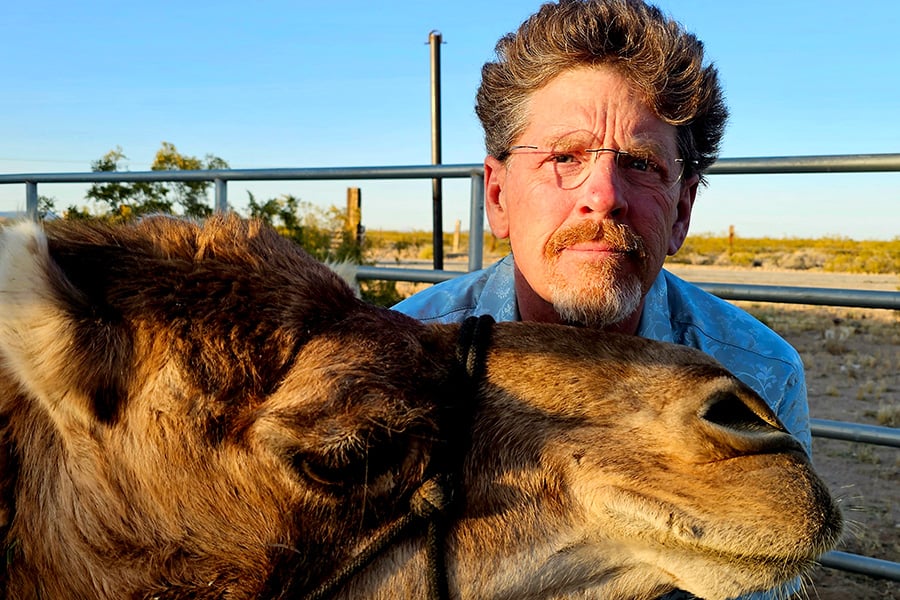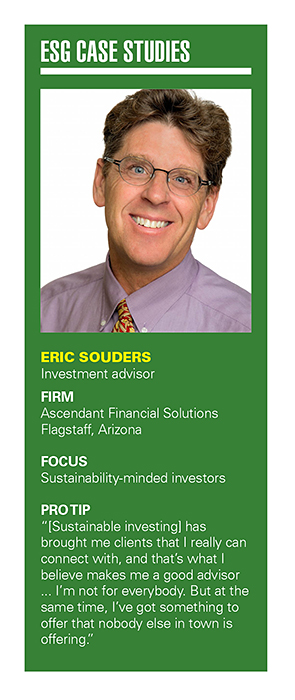

Mike Wood might be the perfect candidate for sustainable investing.
He spent much of his career as an environmental lawyer, and he’s incredibly interested in the nexus of social responsibility and investment, appreciative of the nuances and complications of topics such as engagement versus divestment.

When he read an op-ed by Arizona financial advisor Eric Souders about environmental and social issues around investing, he knew it was time for a change.
“We had a [different] financial advisor in Flagstaff … he was great,” Wood said. “He had everything dialed in, but it seemed like every time I would broach the topic of sustainable investing — maybe even to the point of impact investing — it seemed like he hemmed and hawed.”
Wood said he feels his former advisor’s pain a little, as 10 years ago, environmental, social and governance themes were more complicated for financial professionals to address, given a range of standards and lack of data that is available today.
Wood called Souders, investment advisor at Ascendant Financial Solutions, and after a couple of conversations, he hired him.
Specializing in sustainable and responsible investing “has brought me clients that I really can connect with — and that’s what I believe makes me a good advisor,” Souders said. “I’m not for everybody. But at the same time, I’ve got something to offer that nobody else in town is offering. There’s an added value with that. I’m not just another advisor trying to pump out the highest return as possible.”
A lesson for other advisors might be that if you want to attract like-minded clients, don’t be shy about putting yourself out there. But that approach, which has won Souders numerous customers, also has a downside.
“I’ve lost a few [clients], too,” he said.
His clients “are all the perfect clients,” Souders said, “because we share values. And in this business, in order to do well by your client, you have to be as honest and vulnerable as you are asking them to be.”
Before his career in financial advice, Souders, like Wood, had a lot of interest in environmental causes. In the early ’90s, he was selling energy-efficient light bulbs, solar panels and organic gardening supplies at a specialty store.
Shortly afterward, he moved on to work for an annuity provider. Only later did he focus on his passion — socially responsible investing.
“I’ve come to this with a value structure that was already in place,” Souders said. Often “advisors get into this business because they want to make a lot of money. Most of the advisors I meet, that’s their MO. How does an advisor change their values to incorporate and really believe the talk to sell the ESG story?”
Currently, 98% of his clients are invested in the socially responsible portfolios he runs. Those portfolios, built with institutional shares of mutual funds, are largely fossil fuel-free and exclude companies involved in oil and gas extraction as well as weapons manufacturers. He also provides clients with a carbon-intensity estimate for their portfolios, which on average are about half the rate of comparable indices, Souders said.
As of the end of 2022, he managed about $32 million in assets for 150 families.
“In order to obtain the returns, we have to manage risk. Fiduciary responsibility is being twisted around these days,” Souders said. Sustainable investing represents “the next level of managing risk. This is what investors are looking for.”
That of course resonated with Wood, who now runs a leadership consulting firm. He trusts his advisor to make sound investment decisions.
“I’m your traditional investor in that way,” he said. "What I really want to know is what is the average return.”

LPL's head of HNW planning says too many advisors are making a common mistake.

Market risk index shows hidden perils in seeking safety, and potential benefits from non-traditional investment vehicles.

Friends and family members are "the easiest type of victim to profile and steal from," said one attorney.

The commissioner also known as "Crypto Mom" says the agency is willing to work on different models with stakeholders, though disclosures will remain key.

Cetera's policy advocacy leader explains how gig worker protection proposal might hurt independent financial advisors, and why it's "a complete outlier" in the current legal landscape.
Stan Gregor, Chairman & CEO of Summit Financial Holdings, explores how RIAs can meet growing demand for family office-style services among mass affluent clients through tax-first planning, technology, and collaboration—positioning firms for long-term success
Chris Vizzi, Co-Founder & Partner of South Coast Investment Advisors, LLC, shares how 2025 estate tax changes—$13.99M per person—offer more than tax savings. Learn how to pass on purpose, values, and vision to unite generations and give wealth lasting meaning
